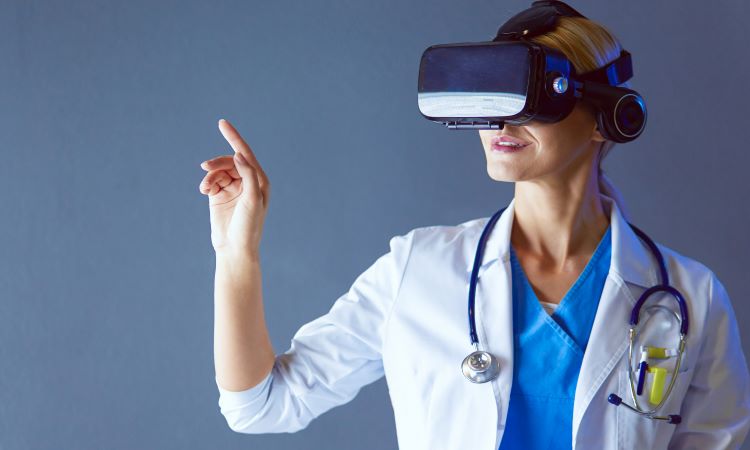
How is Extended Reality Changing the Healthcare Industry?

How is Extended Reality Changing the Healthcare Industry?
Immersive tech has grown in popularity and gained a lot of traction over the last few years because of the landmark developments and milestones it has achieved in the digital space. The major credit for this is to be given to Augmented Reality and Virtual Reality.
Half a decade back, customers used to perceive AR/VR technologies as monotonous prospects with limited usability. In 2021 however, things have changed drastically as enterprises are now looking to integrate advanced technologies like AR/VR, XR, AI, ML, etc.
Extended Reality is rapidly accelerating the usage of immersive tech in the healthcare domain. As per statistics, more than 70% of healthcare analysts are of the view that XR contributes productively in activities related to healthcare and is proving to be an ideal foil.
While it had its impact on every industrial sector, it has made a substantial impact on the healthcare domain. Before getting into it, let us understand what extended reality is.
What is Extended Reality?
Extended Reality is an immersive technology used to create virtual experiences to enhance user experiences. It is a visualization technology that enables users to interact with VR elements as if they were real.
Extended Reality is known to comprise AR, VR, and MR fused together to create an immersive environment. The most important fact about XR is that it possesses a wide range of experiences that combine the virtual and physical worlds. These experiences can be controlled with voice, virtual movements.
How is Extended Reality Used in the Healthcare Domain?
Extended Reality in the healthcare industry has been known as the driver of new opportunities for medical practitioners who are ambitious. And this applies specifically to the new day healthcare organizations.
XR solution can potentially assist surgeons during a procedure. It is significant as it can help save time and carry out surgeries accurately in the future. So let us now get into the benefits of XR solutions in the healthcare domain.
1. Help Diagnose a Patient’s Condition Better
XR can help medical practitioners relieve the pain a patient is going through by engaging them and distracting them from it. For example, a developer can use it to develop a VR-based game that is designed to keep patients occupied during various surgeries and distract them from their pain.
This allows doctors and healthcare professionals to understand their patients better. XR provides experiences that allow healthcare professionals to take the patients’ place and see what they experience.
Not only does this facilitate better treatment but also helps improve the relationship between a doctor and his patient.
2. Surgery Simulators for Trainees
Extended Reality consists of immersive features that open up possibilities to conduct simulated surgeries. These features can be largely helpful for the training of aspiring surgeons. A stimulated surgery process helps them learn the procedure in greater detail and also eliminates the need for a cadaver to try it.
3. Preparation Before Actual Surgeries
XR technology helps surgeons prepare for surgeries in the following ways:
- It generates 3D replicas according to patient scans. They allow a surgeon to have a look at it in detail and collaborate with his or her team on how to go about the actual procedure.
- Surgeons can use an immersive XR headset to gain a clear vision of elements like the cut, the draw, and the tools required for the procedure.
- An XR-based platform can be created for preparation where multiple surgeons can collaborate for discussions.
- Stimulated applications can be created so that surgeons can practice the execution of the procedure.
An Extended Reality application involves various vibration patterns that place the surgeon in an environment where he or she feel like holding actual tools. An app providing such immersive experiences can be the ideal platform to study surgeries integrated with VR.
4. Educational Training for Students
Extended Reality apps in medical education play a crucial role in the training of the budding medical practitioner. These apps are created specifically for educational purposes.
Both doctors and medical students can use them productively to observe intricate details from an accurate representation of a human body. This helps users learn about different procedures and how to they are carried out.
5. Rapid Detection of Health Conditions and Timely Treatment
Have you wondered how many lives can be saved if a doctor can determine someone has a serious health condition by just looking at him or her? This intriguing thought might have been unrealistic a few years back. But it is possible now courtesy of Extended Reality.
A set of immersive technologies can be combined using 3D models to detect the illness of a patient. Complicated health problems like tumors, broken bones, tissue degenerations, etc. can also be detected by XR apps.
The images from this app can be used to show patients a chronological preview of their condition and also the process of their treatment.
Closing Thoughts:
There is no doubt that XR technology is creating several promising opportunities for healthcare industry. Be it advanced medical devices, improved hospital systems, and insurers, or skilled healthcare service providers, the prospects appear very good.
If you are looking to integrate XR into your healthcare domain, Sapizon Technologies is the ideal partner for you. We are one of the top Augmented Reality and Virtual Reality app development companies and possess substantial experience in creating immersive apps.
Our sole focus is to provide cost-effective technological solutions to our clients and help them rise to the next level in their respective domains. Book a free appointment with our team to know more.